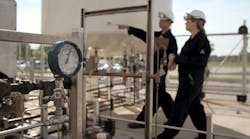Like many biodiesel industry pioneers, Scott Johnson began his foray into the world of alternative fuels in his garage with some basic equipment and know-how. In 2005, Johnson and his wife Kathy were commuting a combined 440 miles a day and facing diesel fuel bills that totaled over $900 per month. Out of necessity, Johnson set up a mini biodiesel production facility in his garage and quickly dropped his fuel bills to only $350 per month.
Even though the monetary savings were very beneficial to his family, Johnson still had to endure some skepticism by others in his community. "I had people laughing at me. The guy that was delivering the methanol to my house was laughing at me, calling me the crazy guy trying to make his own fuel," says Johnson.
However, after friends and neighbors heard how much the Johnsons were saving on their monthly fuel bills, the skepticism quickly turned into intrigue. "In a short time, I had more and more people ask me if I could make [biodiesel fuel] for them," says Johnson. "I have a big shop at home, so I was going to just build a bigger operation there. But, one thing led to another and people kept on asking for more and more, so it came to the point where a few of us began discussing a full-fledged biodiesel production facility."
Johnson, along with four other owners, sat down during the later half of 2005 and began mapping out a plan for taking what started out as the typical garage biodiesel production operation and turning it into one of the largest biodiesel plants in the state of Washington. Just two short years after producing his first batch of biodiesel in his garage, Scott Johnson, is now president of GEN-X Energy Group, Inc. (www.genxenergies.com), a large-scale biodiesel production plant strategically positioned in the southeastern part of Washington.
GEN-X is permitted for five million gallons of biodiesel per year, but on paper Johnson estimates the plant could produce 15 million gallons without any modifications. He says, the plant could easily go to 40 million with a couple more reactors and centrifuges.
Equipment Needs
Since GEN-X wasn’t going to be just another garage biodiesel operation, the newly formed company turned to its local distributor, Northwest Pump & Equipment Co. (www.nwpump.com), for advice on the proper equipment needed for each application within the plant. Rick Fuqua, Northwest Pump’s resident biodiesel expert, consulted with Johnson and immediately began discussing the company’s pump options since pumps are one of the key components within a biodiesel production plant. Fuqua suggested Blackmer (www.blackmer.com) ProVane motor speed sliding vane pumps for methanol recovery, caustic (in this case, it’s potassium phosphate), Magnesol (for wash), and multi-oil feedstock-transfer applications. Johnson agreed and installed Blackmer pumps throughout the facility.
"Blackmer pumps are known for their reliability. You can use them in all different kinds of applications, and we certainly do just that in this plant," says Johnson. "Another nice thing about Blackmer pumps is that they will benefit us financially. Since they’re simple to work on — it’s easy to change the vanes and easy to maintain — we don’t have to worry about downtime."
In addition to the Blackmer ProVane pumps, GEN-X also uses the Blackmer’s XL Series of sliding vane pumps for high-speed truck loading and transfer-rate applications throughout the plant. Both the ProVane and XL vane pumps are designed for reliable continuous duty in biodiesel production operations. The sliding-vane technology provides biodiesel producers with self-priming and suction capabilities. This suction capability can benefit biodiesel operators by stripping lines of residual product in order to improve production yields and avoid contamination issues.
The sliding-vane technology principles of the ProVane and XL pumps are designed to ensure proper sealing and volumetric output performance, even after significant in-service time. This eliminates the efficiency-robbing slip that shortens the life of pumping technologies, such as lobe and gear pumps. The pumps also provide smooth, sliding-vane action without metal-to-metal contact, which reduces pump friction, eliminates galling, and minimizes agitation of fluids.
Introduced by Blackmer in 2005, the ProVane also provides standard features, such as the hydrodynamic journal bearing — a unique fluid boundary-forming principle that eliminates shaft-to-bearing contact. The shaft hydroplanes above the bearing surface on a cushion of liquid. In this hydrodynamic condition there is no metal-to-metal contact or wear and bearing life can be significantly extended. These pumps are engineered to achieve hydrodynamic mode (full film operation — the point offering the lowest bearing friction and least wear). This also maintains optimum bearing characteristics even under a wide range of operating conditions, such as the ones found in the GEN-X biodiesel production plant. Reduced shaft/bearing contact minimizes friction and results in higher mechanical efficiency and smart energy cost savings.
"I’ve met with several biodiesel producers over the past few years, and all of them are very intrigued by the overall efficiencies and energy cost savings you get from the Blackmer pumps," says Fuqua. "When you’re in the energy-production business, using equipment that reduces energy consumption is certainly important. The Blackmer sliding vane pumps do just that."
The ProVane offers efficiency at low flowrates and allows for higher operating speeds and pressures on low-viscosity fluids compared to other types of PD pumps. The ProVane pump is also capable of low-flow, high-head applications on low-viscosity fluids where centrifugal pumps can’t run.
"We have plans to build additional plants, and, from day one, we’ll install all brand-new Blackmer vane pumps," says Johnson.
Feedstock Partnerships
Today, the GEN-X biodiesel plant is on track to produce a modest five million gallons of B100 in 2008, but it expects to quickly reach its long-term goal of 40 million gallons per year. With the Tyson Foods rendering facility located 12 miles down the road, GEN-X has the groundwork in place to acquire enough tallow oil to become a significant producer of biodiesel in the northwestern United States.
"Our feedstock backbone is tallow oil from the Tyson Foods rendering plant just down the road. They could supply us with between five million and eight million gallons of tallow per year. There are also a lot of other oil sources around that could be used for another million gallons per year, but Tyson is a key partner for us moving forward," said Johnson.
In April 2007, ConocoPhillips and Tyson Foods announced a strategic alliance that would allow the major oil company to use beef, pork, and poultry byproduct fat (tallow oil) to create a transportation fuel. After that news hit the streets, Johnson and the rest of GEN-X wanted to know what that meant for their long-term plans with the local Tyson plant.
"When the ConocoPhillips/Tyson Foods partnership on tallow was announced, I called my contact at Tyson and asked him about the situation. He assured me that it won’t impact our agreement," recalled Johnson.
In addition to Tyson, GEN-X is working with farmers and crushers in the area to bring local seed oil into the plant. Johnson also sees a large opportunity to partner with some of the restaurants in the area for used, or second-use oil that would supply about 10,000 gallons per month. Not a significant amount, but Johnson is more than happy to work with anyone with the same mindset.
"Another partner that we’ve signed an agreement with is Westway Feed Products, Inc. They are located right next door," Johnson said as he walked out the back door of the GEN-X facility and pointed to the Westway operation. "They provide feed to livestock industries in the area. Westway can use our glycerin, which is a byproduct of our biodiesel production process, as a feedsource. Therefore, we are closing that loop between the feed, tallow, and biodiesel."
Future Plans
With a new 18,000 sq.-ft. facility, 11 employees, and a brand new company, Johnson and the other owners at GEN-X are already thinking about the next chapter in their story.
"All of us are very excited about how far we can take this," says Johnson. Fernando Moreno, our vice president, Ray Benavides, our VP of Sales & Marketing, Joe Stanton, our director of plant operations, Brian Moreno, a stockholder, and myself are happy to come to work and finally be doing something that actually helps make a difference."
Johnson went on to mention that GEN-X would like to open or partner with a crushing plant and crush seeds grown locally. They are working with several farmers in the area for that goal. Two crushers that work with GEN-X recently started operation and are already at 100 percent capacity because the price of canola peaked at the same time they opened.
"We are also creating an engineering firm that would be located here. We’re going to bring an engineer on board, John Forrest, that has a tremendous amount of experience in the oil industry," says Johnson. "That way, he can focus on engineering projects and we can focus on creating biodiesel."
GEN-X continues to refine its process in these early months, along with growing its base of solid partnerships. When the company first discussed the idea of opening a biodiesel plant, Johnson and the other owners were nervous about the potential customer base in the northwest United States. Today, GEN-X is bursting at the seams and is a true testament to the "build it and they will come" mentality.
Doug Cumpston is the western regional manager at Blackmer, a designer and manufacturer of flow technologies, including rotary vane positive-displacement pumps, centrifugal pumps, and sliding vane and reciprocating compressors for the transfer of biodiesel and biodiesel-related products. Mr. Cumpston earned bachelor’s degree in Geology from Colorado State University. He has been with Blackmer for 12 years and has 26 years of industry experience, with positions in channel management, application engineering, and distribution management. Mr. Cumpston can be reached at [email protected] or 616 241-1611. For more information on GEN-X Energy Group, Inc., call 509 547-2447.
www.blackmer.com
www.genxenergies.com
This article was originally published in the January 2008 issue of Biodiesel Magazine (www.biodieselmagazine.com).



